#2022 russian invasion of ukraine
Text
Much of the public discussion of Ukraine reveals a tendency to patronize that country and others that escaped Russian rule. As Toomas Ilves, a former president of Estonia, acidly observed, “When I was at university in the mid-1970s, no one referred to Germany as ‘the former Third Reich.’ And yet today, more than 30 years after the fall of the Berlin Wall, we keep on being referred to as ‘former Soviet bloc countries.’” Tropes about Ukrainian corruption abound, not without reason—but one may also legitimately ask why so many members of Congress enter the House or Senate with modest means and leave as multimillionaires, or why the children of U.S. presidents make fortunes off foreign countries, or, for that matter, why building in New York City is so infernally expensive.
The latest, richest example of Western condescension came in a report by German military intelligence that complains that although the Ukrainians are good students in their training courses, they are not following Western doctrine and, worse, are promoting officers on the basis of combat experience rather than theoretical knowledge. Similar, if less cutting, views have leaked out of the Pentagon.
Criticism by the German military of any country’s combat performance may be taken with a grain of salt. After all, the Bundeswehr has not seen serious combat in nearly eight decades. In Afghanistan, Germany was notorious for having considerably fewer than 10 percent of its thousands of in-country troops outside the wire of its forward operating bases at any time. One might further observe that when, long ago, the German army did fight wars, it, too, tended to promote experienced and successful combat leaders, as wartime armies usually do.
American complaints about the pace of Ukraine’s counteroffensive and its failure to achieve rapid breakthroughs are similarly misplaced. The Ukrainians indeed received a diverse array of tanks and armored vehicles, but they have far less mine-clearing equipment than they need. They tried doing it our way—attempting to pierce dense Russian defenses and break out into open territory—and paid a price. After 10 days they decided to take a different approach, more careful and incremental, and better suited to their own capabilities (particularly their precision long-range weapons) and the challenge they faced. That is, by historical standards, fast adaptation. By contrast, the United States Army took a good four years to develop an operational approach to counterinsurgency in Iraq that yielded success in defeating the remnants of the Baathist regime and al-Qaeda-oriented terrorists.
A besetting sin of big militaries, particularly America’s, is to think that their way is either the best way or the only way. As a result of this assumption, the United States builds inferior, mirror-image militaries in smaller allies facing insurgency or external threat. These forces tend to fail because they are unsuited to their environment or simply lack the resources that the U.S. military possesses in plenty. The Vietnamese and, later, the Afghan armies are good examples of this tendency—and Washington’s postwar bad-mouthing of its slaughtered clients, rather than critical self-examination of what it set them up for, is reprehensible.
The Ukrainians are now fighting a slow, patient war in which they are dismantling Russian artillery, ammunition depots, and command posts without weapons such as American ATACMS and German Taurus missiles that would make this sensible approach faster and more effective. They know far more about fighting Russians than anyone in any Western military knows, and they are experiencing a combat environment that no Western military has encountered since World War II. Modesty, never an American strong suit, is in order.
— Western Diplomats Need to Stop Whining About Ukraine
#eliot a. cohen#current events#politics#ukrainian politics#american politics#warfare#strategy#tactics#diplomacy#russo-ukrainian war#2022 russian invasion of ukraine#war in afghanistan#vietnam war#ukraine#usa#toomas hendrik ilves
477 notes
·
View notes
Video

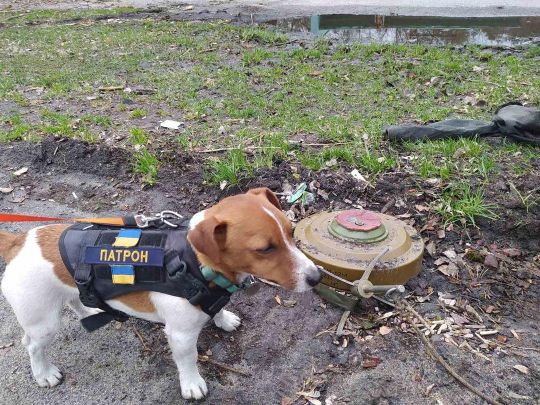
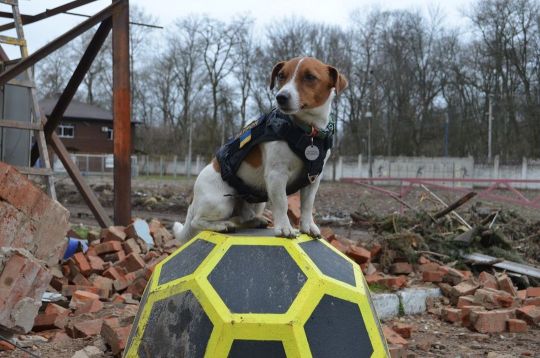
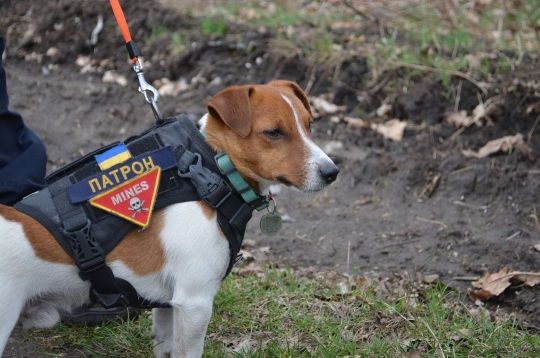
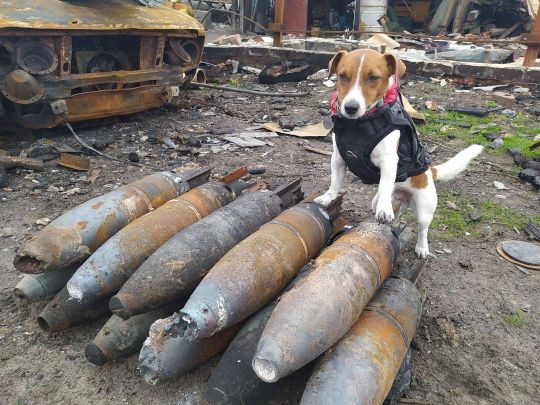
Patron the sapper dog hunting for mines in Ukraine!
Four-legged friends doing there part for the war effort in Ukraine!
#2022 russian invasion of ukraine#2022 russia-ukraine news#Patron the sapper dog#Patron the sapper dog hunting for mines in Ukraine!#puppies#dogs#working dogs#pets#petslover#adorable pets#peace#peaceful#peace for ukraine#peace for all#happy#happiness#hope#hopeful#ukraine#dogs on tumblr#dogs on instagram
3K notes
·
View notes
Text
On war’s second anniversary, Ukraine’s scientific community mourns lost colleagues
As an expert on river ecosystems with the Institute of Hydrobiology, Shevtsova in the 1970s and ’80s traveled frequently for fieldwork to diverse locales including Poland, Iraq, and Libya—a rare privilege for a Soviet scientist. “She was a tiny woman, but always elegant. She was nicknamed ‘Hummingbird,’” Natalia Shevtsova says. At 75, long past the customary retirement age, Lyudmila Shevtsova joined the ecology faculty at National University of Kyiv-Mohyla Academy. Up until the end, “she was still quite intellectually engaged with students and other faculty members. And so friendly—always smiling,” says ecologist Viktor Karamushka, who chairs the university’s Department of Environmental Studies.
Lyudmila Shevtsova wanted her granddaughters, like their mother, to follow in her footsteps and study hydrobiology. They demurred. “I told her I had another vision for my life,” says Daryna Gulei. But when Gulei, 28, phoned her grandmother on 27 December 2023 to say she would defend her Ph.D. in architecture the next day at Kyiv National University of Construction and Architecture, “She was so happy! She read my dissertation twice, gave me some questions.” Gulei shared the good news of her successful defense the last time they spoke.
On 2 January, Gulei and her husband sped across Kyiv to the apartment building after her mother called to say they’d been hit. Dawn was breaking over a melee of firefighters, paramedics, and shaken residents. “I felt my grandmother close by,” Gulei says, and just then a paramedic emerged from the building carrying Lyudmila Shevtsova. Her body was riddled with shrapnel, and she had lost a lot of blood, but she was still breathing.
Natalia says her mother was fading fast and could not speak. “But it was clear she understood I was alive. I hope that gave her some comfort,” Natalia says. “Then my dear mother turned her head away, and died.”
#current events#science#academia#russo-ukrainian war#2022 russian invasion of ukraine#ukraine#russia#liudmyla shevtsova#volodymyr kozlovskyy#igor galkin
80 notes
·
View notes
Text
Imagine that someone—perhaps a man from Florida, or maybe even a governor of Florida—criticized American support for Ukraine. Imagine that this person dismissed the war between Russia and Ukraine as a purely local matter, of no broader significance. Imagine that this person even told a far-right television personality that “while the U.S. has many vital national interests ... becoming further entangled in a territorial dispute between Ukraine and Russia is not one of them.” How would a Ukrainian respond? More to the point, how would the leader of Ukraine respond?
As it happens, an opportunity to ask that hypothetical question recently availed itself. The chair of the board of directors of The Atlantic, Laurene Powell Jobs; The Atlantic’s editor in chief, Jeffrey Goldberg; and I interviewed President Volodymyr Zelensky several days ago in the presidential palace in Kyiv. In the course of an hour-long conversation, Goldberg asked Zelensky what he would say to someone, perhaps a governor of Florida, who wonders why Americans should help Ukraine.
Zelensky, answering in English, told us that he would respond pragmatically. He didn’t want to appeal to the hearts of Americans, in other words, but to their heads. Were Americans to cut off Ukraine from ammunition and weapons, after all, there would be clear consequences in the real world, first for Ukraine’s neighbors but then for others:
If we will not have enough weapons, that means we will be weak. If we will be weak, they will occupy us. If they occupy us, they will be on the borders of Moldova and they will occupy Moldova. When they have occupied Moldova, they will [travel through] Belarus and they will occupy Latvia, Lithuania, and Estonia. That’s three Baltic countries which are members of NATO. They will occupy them. Of course, [the Balts] are brave people, and they will fight. But they are small. And they don’t have nuclear weapons. So they will be attacked by Russians because that is the policy of Russia, to take back all the countries which have been previously part of the Soviet Union.
And after that, if there were still no further response? Then, he explained, the struggle would continue:
When they will occupy NATO countries, and also be on the borders of Poland and maybe fight with Poland, the question is: Will you send all your soldiers with weapons, all your pilots, all your ships? Will you send tanks and armored vehicles with your young people? Will you do it? Because if you will not do it, you will have no NATO.
At that point, he said, Americans will face a different choice: not politicians deciding whether “to give weapons or not to give weapons” to Ukrainians, but instead, “fathers and mothers” deciding whether to send their children to fight to keep a large part of the planet, filled with America’s allies and most important trading partners, from Russian occupation.
But there would be other consequences too. One of the most horrifying weapons that Russia has used against Ukraine is the Iranian-manufactured Shahed drone, which has no purpose other than to kill civilians. After these drones are used to subdue Ukraine, Zelensky asked, how long would it be before they are used against Israel? If Russia can attack a smaller neighbor with impunity, regimes such as Iran’s are sure to take note. So then the question arises again: “When they will try to occupy Israel, will the United States help Israel? That is the question. Very pragmatic.”
Finally, Zelensky posed a third question. During the war, Ukraine has been attacked by rockets, cruise missiles, ballistic missiles—“not hundreds, but thousands”:
So what will you do when Russia will use rockets to attack your allies, to [attack] civilian people? And what will you do when Russia, after that, if they do not see [opposition] from big countries like the United States? What will you do if they will use rockets on your territory?
And this was his answer: Help us fight them here, help us defeat them here, and you won’t have to fight them anywhere else. Help us preserve some kind of open, normal society, using our soldiers and not your soldiers. That will help you preserve your open, normal society, and that of others too. Help Ukraine fight Russia now so that no one else has to fight Russia later, and so that harder and more painful choices don’t have to be made down the line.
“It’s about nature. It’s about life,” he said. “That’s it.”
#current events#warfare#politics#russian politics#american politics#russo-ukrainian war#2022 russian invasion of ukraine#russia#ukraine#usa#volodymyr zelenskyy#ron desantis#nato
245 notes
·
View notes
Quote
I want to ask Putin, why did he shoot and kill my son? What for? Who asked him to come here with such threatening weapons? Not only did he kill our children, but he killed us, their mothers. These days I am a dead woman. And I want to address all mothers of the world: rebel against that assassin.
Valentyna, mother of taxi driver Petro Shepel, who was killed by the Russians on the last day of the occupation of Balakliya
23 notes
·
View notes
Text
My Opinion On The Russian Invasion Of Ukraine
On 24 February 2022, the Russian Troops marched into the small nation of Ukraine, setting both the people of Ukraine in utter chaos, as well as the world superpowers. The West retaliated immediately to this bold move by Russian President Vladimir Putin. As of the current time(7.October.2022), the war is still going on, and voluntary troops from different countries of the West have been participating in the War from the side of Ukraine. The Ukrainians are also doing everything in their hands to protect their nation and their freedom.
How, did it all happen?
But, how did it all happen, in an era, where the so-called supreme race of white people, self-proclaimed themselves as civilized and superior? Let's discuss the events which led to this. As we all know, the USSR disintegrated in 1992, after its disintegration, Russia warned all its former territorial states not to join the European Union and the Northern Atlantic Treaty Organization(NATO), and the West also insured Russia that they won't let them join these organizations, but Ukraine tried to in 2012, so Russia annexed, the Crimean region of Ukraine, but once again Ukraine repeated the same mistake and thus, naturally for its own national security and interest Russia declared war on Ukraine.
The most hypocritical part of this situation is that NATO and the EU assured Russia that its former territories won't be added to NATO or the EU, but they were still added to these organizations.
The Funds for War
As we all are, known to the fact that the U.S.A sanctioned Russia at the start of this war and the entire Western World is criticizing India for buying oil from Russia. But notice one thing after being sanctioned, Russia is still able to keep up with the war, how? Because the EU is the one funding this war, Germany, Netherlands, Spain, France, Poland, and several other countries in the EU are still importing crude oil, pipeline gas, and coal from Russia for their energy needs. Just recently on July 21st the Nord 1 gas pipeline from Russia to Germany went down due to the lack of maintenance, and the US lifted the sanctions imposed and let the required part be imported to Russia from Canada. Why? Because the German economy would allegedly suffer very significant hardship.
Gains for Russia
Russia has started this war for its own national interest, so therefore it must gain something out of it, as history has repeatedly taught that, wars and battles don't simply happen for no reason as wars are costly. Through this war, Russia will almost be able to gain complete control over the Black Sea, if it weren't for Turkey, as well as, it will gain control over the fertile farmlands of Ukraine. So this war is a win-win situation for Russia.
Losses for Ukraine
Even though I am in no position to say this, it was one of the worst military decisions in the decade taken by the President of Ukraine 'Volodymyr Zelenskyy', to fight back against Russia, a country which is 28.32 times bigger than Ukraine, which has the world's 3rd strongest military.
Even if hypotactically Ukraine wins the war now, which it will not, it will have already suffered enormous losses in this war. Millions of its citizens have been displaced, and it has now lost almost all of its infrastructure(roads, buildings, apartments, factories, etc.) now Ukraine is at least pushed 50 years back in the world.
And if it loses, we all know what will happen. There are no arguments for that.
What's in it for India
Due to this war, there was a rise in inflation in Western countries, especially India's old colonizer the United Kingdom. Since Ukraine was a major wheat producer and exporter in the world, but now due to the war it's not able to export wheat anymore, thus naturally there is a food shortage in the world, and since Russia was a major fossil fuel exporter of the world, but due to the sanctions it's not able to export anymore. Compiling all of this together, with the fact that India is a major wheat producer, Indian diplomacy has managed to set itself in a proper global position, by exporting wheat at a cheap price, as well as by defying the Western countries and standing with its old trustworthy noble kinsman Russia.
Russia's inability to export fossil fuels to Europe is leading the European economy into chaos and slowly leading the European economy to bankruptcy. This is a major gain for the rising Indian economy.
After all, it is well said, "One's loss is one's gain".
Where should India stand
After reading the last topic it is pretty clear, where should India stand, which is neutral. We should maintain good relations with the West also, India is currently in not a position like Russia or China to openly defy the Western powers on a global scale, but since Russia is an old friend of India, we should wish for its victory in this war, as well as for the safety of the Ukrainian people. But out of all this, the most important thing is India's national interest, which is being satisfied by our diplomats and especially India's brand ambassador(Foreign Minister) Dr. S. Jaishankar. At the current moment, we might not be able to see the benefits, but such things are done in a long-term plan, elucidating it, in the near future India and its citizens will greatly profit from the 2022 Russian Invasion of Ukraine.
In such things, we should be rational not emotional.
2 notes
·
View notes
Text
youtube
#JKLN#Ukraine#2022 Russian Invasion of Ukraine#music#soundtracks to life#this goes so hard#hey hey hey this is the shit Sasha and Aleksis would go off for#Youtube
1 note
·
View note
Text
No because those ig girls who post them in the smallest bikini ever one slip away from being banned on ig, and the caption being “#saveukrain😘🇺🇦🇺🇦🇺🇦”
#peace for ukraine#2022 russian invasion of ukraine#ukraine#2022 russia ukraine news#russia#ig memes#instagram#instagram memes
0 notes
Text
Russia-Ukraine crisis live updates | Intense fighting in Ukraine’s bombed-out Sievierodonetsk
Russia-Ukraine crisis live updates | Intense fighting in Ukraine’s bombed-out Sievierodonetsk
Two British citizens and a Moroccan were sentenced to death on June 9 by pro-Moscow rebels in eastern Ukraine for fighting on Ukraine’s side.
A court in the self-proclaimed Donetsk People’s Republic found the three men guilty of working toward a violent overthrow of power, an offense punishable by death in the unrecognized republic. They were also convicted of mercenary activities and…
View On WordPress
#2022 russian invasion of ukraine#bombedout#crisis#did russia defeat ukraine#fighting#Intense#is russia ukraine war end#Live#russia ukraine attack#russia ukraine conflict#russia ukraine latest news#russia ukraine live updates#russia ukraine news#Russia Ukraine war#russia ukraine war news#Russia-Ukraine Crisis#russian invasion#RussiaUkraine#Sievierodonetsk#ukraine invasion#Ukraines#Updates#vladimir putin russia ukraine war#what happened in ukraine
0 notes
Text
Machine Gun Trolling During A Shootout In Ukraine
Machine Gun Trolling During A Shootout In Ukraine
File: Військовослужбовці окремого батальйону морської піхоти долали смугу морського піхотинця (41112657395).jpg
All that I can remember of this dream is that it took place during the day in Ukraine as the 2022 Russian Invasion Of Ukraine was going on, but I am not sure if I was in the dream or not.
The war was still going on, and a shootout was taking place between soldiers outside in a field…
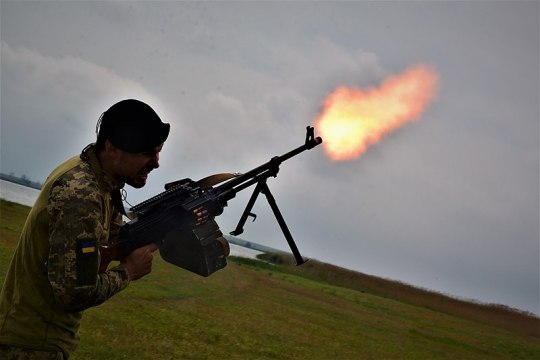
View On WordPress
#2022 Russian Invasion Of Ukraine#Gun#Gunshot#Machine Gun#Military#Russia#Russian#Shooting#Shootout#Sleep#Soldier#Ukraine#Ukrainian#War
1 note
·
View note
Text
In the terrible winter of 1932–33, brigades of Communist Party activists went house to house in the Ukrainian countryside, looking for food. The brigades were from Moscow, Kyiv, and Kharkiv, as well as villages down the road. They dug up gardens, broke open walls, and used long rods to poke up chimneys, searching for hidden grain. They watched for smoke coming from chimneys, because that might mean a family had hidden flour and was baking bread. They led away farm animals and confiscated tomato seedlings. After they left, Ukrainian peasants, deprived of food, ate rats, frogs, and boiled grass. They gnawed on tree bark and leather. Many resorted to cannibalism to stay alive. Some 4 million died of starvation.
At the time, the activists felt no guilt. Soviet propaganda had repeatedly told them that supposedly wealthy peasants, whom they called kulaks, were saboteurs and enemies—rich, stubborn landowners who were preventing the Soviet proletariat from achieving the utopia that its leaders had promised. The kulaks should be swept away, crushed like parasites or flies. Their food should be given to the workers in the cities, who deserved it more than they did. Years later, the Ukrainian-born Soviet defector Viktor Kravchenko wrote about what it was like to be part of one of those brigades. “To spare yourself mental agony you veil unpleasant truths from view by half-closing your eyes—and your mind,” he explained. “You make panicky excuses and shrug off knowledge with words like exaggeration and hysteria.”
He also described how political jargon and euphemisms helped camouflage the reality of what they were doing. His team spoke of the “peasant front” and the “kulak menace,” “village socialism” and “class resistance,” to avoid giving humanity to the people whose food they were stealing. Lev Kopelev, another Soviet writer who as a young man had served in an activist brigade in the countryside (later he spent years in the Gulag), had very similar reflections. He too had found that clichés and ideological language helped him hide what he was doing, even from himself:
I persuaded myself, explained to myself. I mustn’t give in to debilitating pity. We were realizing historical necessity. We were performing our revolutionary duty. We were obtaining grain for the socialist fatherland. For the five-year plan.
There was no need to feel sympathy for the peasants. They did not deserve to exist. Their rural riches would soon be the property of all.
But the kulaks were not rich; they were starving. The countryside was not wealthy; it was a wasteland. This is how Kravchenko described it in his memoirs, written many years later:
Large quantities of implements and machinery, which had once been cared for like so many jewels by their private owners, now lay scattered under the open skies, dirty, rusting and out of repair. Emaciated cows and horses, crusted with manure, wandered through the yard. Chickens, geese and ducks were digging in flocks in the unthreshed grain.
That reality, a reality he had seen with his own eyes, was strong enough to remain in his memory. But at the time he experienced it, he was able to convince himself of the opposite. Vasily Grossman, another Soviet writer, gives these words to a character in his novel Everything Flows:
I’m no longer under a spell, I can see now that the kulaks were human beings. But why was my heart so frozen at the time? When such terrible things were being done, when such suffering was going on all around me? And the truth is that I truly didn’t think of them as human beings. “They’re not human beings, they’re kulak trash”—that’s what I heard again and again, that’s what everyone kept repeating.
— Ukraine and the Words That Lead to Mass Murder
#anne applebaum#ukraine and the words that lead to mass murder#current events#history#politics#russian politics#sociology#psychology#communism#warfare#totalitarianism#propaganda#holodomor#russo-ukrainian war#2022 russian invasion of ukraine#russia#ukraine#viktor kravchenko#lev kopelev#vasily grossman#kulaks
263 notes
·
View notes
Video
All Along The Watchtower
Brothers in arms on an observation post watching for the enemy.
#2022 russian invasion of ukraine#2022 russia-ukraine news#ukraine#russia#brothers in arms#cat#caturday#cats on tumblr#friends#friends forever#friends for life#all along the watchtower#war#world at war#peace#peace for all#peace for ukraine
482 notes
·
View notes
Text
For nearly the entirety of the past decade, a question has stalked, and sometimes consumed, American politics: Why do Donald Trump and his acolytes heap such reverent praise on Vladimir Putin? The question is born of disbelief. Adoration of the Russian leader, who murders his domestic opponents, kidnaps thousands of Ukrainian children, and interferes in American presidential elections, is so hard to comprehend that it seems only plausibly explained by venal motives—thus the search to find the supposed kompromat the Kremlin lords over Trump or compromising business deals that Trump has pursued in Moscow.
But there’s a deeper, more nefarious truth about people on the right’s baffling unwillingness to criticize the Kremlin: They actually share its worldview. Putin worship isn’t even an aberration in the history of conservatism, merely the latest instance of a long tradition of admiring foreign dictators. Over the past century, without ever really blushing, the American right has similarly celebrated the likes of Adolf Hitler, Francisco Franco, and just about every Latin American military junta that called itself anti-communist.
The right hails these dictators as ideological comrades in the war to preserve traditional society, the values of order and patriarchy, against the assault of the decadent left. Unlike conservative politicians in the United States, these foreign leaders don’t even need to bother with mouthing encomiums to concepts like tolerance, freedom and democracy. They can deliver reactionary politics in the unvarnished form that some hardliners on the American right have always hoped would take root in their own country. As the journalist Jacob Heilbrunn argues in America Last, his history of conservatives’ romance with dictators, “Conservatives have searched for a paradise abroad that can serve as a model at home.”
#history#current events#politics#american politics#russian politics#authoritarianism#fascism#racism#antisemitism#ww1#ww2#holocaust#russo-ukrainian war#2022 russian invasion of ukraine#usa#ussr#russia#donald trump#vladimir putin
1 note
·
View note
Text
The Wagner Group mercenaries marched 800 kilometers across Russia, shot down planes and helicopters, took over a regional military command, provoked a panic in Moscow—troops dug trenches, the mayor told everyone to stay home—and then stood down. Yet in a way, the strangest aspect of Saturday’s aborted coup was the reaction of the people of Rostov-on-Don, including the city’s military leaders, to the soldiers who arrived and declared themselves to be their new rulers.
The Wagner mercenaries showed up in the city early Saturday morning. They met no resistance. Nobody shot at them. One photograph, published by The New York Times, shows them walking at a leisurely pace across a street, one of their tanks in the background, holding yellow coffee cups.
Yevgeny Prigozhin, Wagner’s violent ex-con leader, posted videos of himself chatting with the local commanders in the courtyard of the headquarters of Russia’s Southern Military District. Nobody seemed to mind his being there.
Outside, street sweepers continued their work. Early in the morning, a few people came to gawk, but not many. After Russian President Vladimir Putin gave a panicked speech on television, comparing the situation to 1917 and evoking the ghost of civil war, one man pushing a bicycle was filmed berating the Wagnerites and telling them to go home. The troops laughed him off. But later in the day, more people showed up, and the atmosphere grew warmer.
People shook their hands, brought them food, took selfies. “People are bringing pirozhki, apples, chips. Everything there in the store has been bought to give to the soldiers,” one woman said on camera. In the evening, after Prigozhin had decided to stand down and go home (wherever home turns out to be), he drove away in an SUV with crowds filming him on their cellphones and cheering him on, as if he were a celebrity leaving a movie premiere or a gallery opening. Some chanted “Wagner! Wagner!” as the troops emerged into the street. This was the most remarkable aspect of the whole day: Nobody seemed to mind, particularly, that a brutal new warlord had arrived to replace the existing regime—not the security services, not the army, and not the general public. On the contrary, many seemed sorry to see him go.
The response is hard to understand without reckoning with the power of apathy, a much undervalued political tool. Democratic politicians spend a lot of time thinking about how to engage people and persuade them to vote. But a certain kind of autocrat, of whom Putin is the outstanding example, seeks to convince people of the opposite: not to participate, not to care, and not to follow politics at all. The propaganda used in Putin’s Russia has been designed in part for this purpose. The constant provision of absurd, conflicting explanations and ridiculous lies—the famous “firehose of falsehoods”— encourages many people to believe that there is no truth at all. The result is widespread cynicism. If you don’t know what’s true, after all, then there isn’t anything you can do about it. Protest is pointless. Engagement is useless.
But the side effect of apathy was on display yesterday as well. For if no one cares about anything, that means they don’t care about their supreme leader, his ideology, or his war. Russians haven’t flocked to sign up to fight in Ukraine. They haven’t rallied around the troops in Ukraine or held emotive ceremonies marking either their successes or their deaths. Of course they haven’t organized to oppose the war, but they haven’t organized to support it either.
Because they are afraid, or because they don’t know of any alternative, or because they think it’s what they are supposed to say, they tell pollsters that they support Putin. And yet, nobody tried to stop the Wagner group in Rostov-on-Don, and hardly anybody blocked the Wagner convoy on its way to Moscow. The security services melted away, made no move and no comment. The military dug some trenches around Moscow and sent some helicopters; somebody appears to have sent bulldozers to dig up the highways, but that was all we could see. Who will respond if a more serious challenge to Putin ever emerges? Certainly the military will think twice: Perhaps a dozen Russian servicemen, mostly pilots, died at the hands of the Wagner mutineers, more than died during the failed coup of 1991. Nobody seems particularly bothered about them.
One day after this aborted coup, it is too early to speculate about Prigozhin’s true motives, about what he was really given in exchange for standing down, about where Putin really spent the day on Saturday—some say St. Petersburg, some say a dacha in Novgorod—or about anything else, really. But the flimsiness of this regime’s ideology and the softness of its support have been suddenly laid bare. Expect more repression as Putin tries to stay in charge, more chaos, or both.
#current events#politics#russian politics#psychology#sociology#russo-ukrainian war#2022 russian invasion of ukraine#russia#yevgeny prigozhin#vladimir putin#wagner group
162 notes
·
View notes
Quote
As in much of the world, the price of food, fuel and fertiliser have all increased here since Russia launched its full-scale invasion of Ukraine in February. But the Philippines is particularly vulnerable. It has to import food - including rice and all cereals such as wheat - to feed its growing population, making it one of the most food-insecure countries in Asia. even the food the Philippines does grow is far from guaranteed in a country which is the most disaster-prone in the world. Typhoons batter the islands with growing frequency and severity. There have been a total of 16 severe storms this year which have destroyed or partially damaged more than $225m (£186m) worth of agricultural land, according to the latest figures from the Department of Agriculture.
‘The Philippines' food worries amid Ukraine war and typhoons’, BBC
#BBC#Philippines#Department of Agriculture#price rise#2022 Russian invasion of Ukraine#food insecurity#agricultural land destruction
10 notes
·
View notes
Text
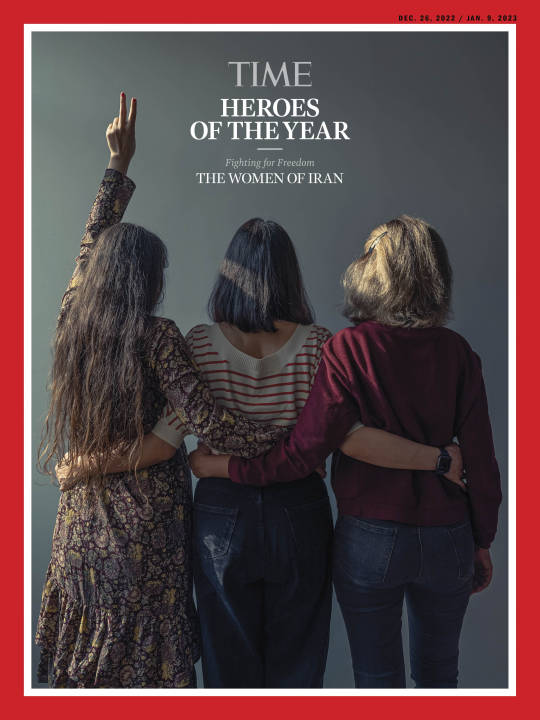

TIME's 2022 Heroes l Person of the Year
Only in the darkness can you see the stars. —Martin Luther King Jr.
#time magazine#december#2022#human rights#women rights#women life freedom#iran#iranian women#ukraine#russia#war#russian invasion#volodymyr zelensky#masha amini#timepoy
971 notes
·
View notes